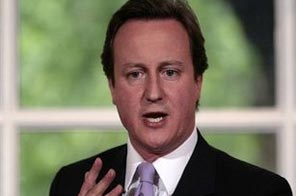Cameron pledges Lisbon vote
LONDON: Opposition Conservative leader David Cameron, who polls tip to become prime minister next year, on Sunday highlighted his hostility to the EU reform treaty despite its acceptance by Ireland.
Speaking on the eve of his party's conference in Manchester, Cameron insisted he would hold a referendum on the Lisbon treaty if he wins a general election and it has not yet been ratified across Europe.
But he repeatedly dodged questions about what he would do if the Conservatives came to power and it has been agreed by Poland and the Czech Republic -- the only two nations yet to ratify it.
"We want to have a referendum," he told BBC television, adding that his party would lead a No campaign.
"I think people in this country will be frustrated and angry that Ireland has been able to vote twice on a treaty that changes the way we're governed and yet we haven't been able to vote once."
Outlining his critique, Cameron added: "The problem is that it's taking powers away from the nation state, centralising them in Europe, we don't think that's the right approach."
Irish voters on Friday backed the Lisbon Treaty, which aims to streamline decision-making in the 27-nation bloc, by 67 percent in their second referendum.
Cameron insisted that he had a "very good relationship" with Germany's Chancellor Angela Merkel based on "frank, honest and candid talk", despite reports the centre-right pair had fallen out.
The Conservatives are well ahead of Prime Minister Gordon Brown's Labour Party in opinion polls and are expected by most commentators to win a general election which must be held by June next year.
Cameron, whose party has a strong Eurosceptic strand, has taken the Conservatives into an anti-federalist bloc in the European Parliament.
Its allies there include the Polish Law and Justice party, co-founded by Polish President Lech Kaczynski, and Czech ex-prime minister Mirek Topolanek's Civic Democratic Party.
Polish Prime Minister Donald Tusk said Saturday he hopes for his country to ratify the EU treaty "very quickly."
But eurosceptic Czech President Vaclav Klaus said Prague's ratification was "not on the cards" anytime soon, noting that the Czech constitutional court has asked him not to take any action until it has ruled on the matter.






